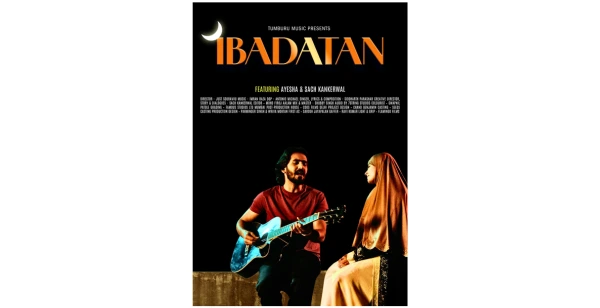When Devotion Turns to Dilemma: The Story and Song of Ibadatan

In a country where music is often dominated by commercial formulas and algorithm- chasing beats, “Ibadatan” by Tumburu Music dares to tread a more meaningful path. This music video is not just a song—it’s an experience. A powerful, poetic exploration of love, loss, and spiritual rebellion, Ibadatan asks a deeply unsettling yet necessary question: What happens when your love is your only worship, but the world refuses to accept your god?
Watch the full video here: https://youtu.be/IUV9eaXUqcQ?si=ZzB6caYEc61V8OkZ
Siddharth Parashar: The Voice of Surrender
At the heart of Ibadatan lies a voice that trembles with unspoken grief. Siddharth Parashar, who delivers both the vocals and lyrics, brings to life a character that is equal
parts lover and devotee. His singing is less about musical flair and more about emotional honesty. Every note feels like a confession. Every pause feels like prayer.
Siddharth’s lyrics are not ornamental—they’re essential. Lines like “Tere dard mein hi toh meri ibadat hai” (Your pain is my worship) redefine devotion. Here, God isn’t in the temple or mosque. God lives in the memory of someone you can’t have, in the sacrifices you make for a love you’re not allowed to keep. His voice captures the exact moment when longing becomes sacred.
Sach Kankerwal: The Storyteller in Silence
While the audio tells you what the heart feels, the visuals show you what the soul suffers. Sach Kankerwal, who plays the lead role and also serves as the creative director, turns Ibadatan into a visceral experience. His performance is not loud or theatrical—it’s deeply internal. Through subtle gestures, broken postures, and intense silences, Sach portrays a man torn between love and societal expectations.
His chemistry with Aayesha, who plays the other half of this forbidden love story, is
electric yet restrained. Their story doesn’t need grand dialogues or dramatic breakdowns. The pain is in the unsaid—the glances not exchanged, the words not spoken, the prayers not answered. Together, they make the audience feel the cost of love when it comes with a price tag of identity and faith.
A Song That Dares to Ask the Forbidden
In a time when few artists venture into sensitive territory, Ibadatan boldly enters the world of interfaith relationships and emotional conflict. It doesn’t preach. It doesn’t accuse. Instead, it reflects. It reflects the inner battle of millions who love across boundaries drawn by family, religion, caste, or community.
Composed by Imran Raza, the song is minimalist but emotionally rich. The music serves as a gentle frame for the storm within. The simplicity of the arrangement allows the emotions to echo, making every word feel heavier and every silence more pronounced.
Why Ibadatan Matters
What makes Ibadatan stand out in the independent music scene is not just its subject matter—but its execution. This isn’t just art for art’s sake. This is truth-telling through
music. This is the kind of song that stays with you long after it’s over. It forces you to think, to feel, and most importantly—to question.
At its core, Ibadatan isn’t about rebellion. It’s about quiet resistance. It’s about people who dare to love when they’re told not to. It’s about devotion that doesn’t bow to institutions but rises from the heart. And in asking the question “What would you give up for love?”, it answers with its own offering: vulnerability, pain, and honesty.
Final Words: Ibadatan Is Not Just a Song—It’s a Mirror
In the crowded world of digital releases and viral trends, Tumburu Music delivers a work that feels timeless. Ibadatan does not chase numbers—it chases meaning. And in doing so, it hits harder than any chart-topper ever could.

Experience it yourself: Watch “Ibadatan” on YouTube


